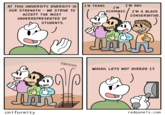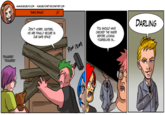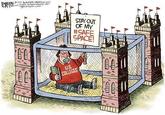Safe Space
Confirmed 78,988
Part of a series on Social Justice Blogging. [View Related Entries]
Safe Space
Part of a series on Social Justice Blogging. [View Related Entries]
| Navigation |
| About • Origin • Spread • Search Interest • External References • Recent Images • Recent Videos |
About
"Safe Space" is a term which typically refers to areas on university campuses where perceived bigotry toward victim groups, harassment or disagreement about politics is not tolerated. While advocates laud safe spaces as sanctuaries for those who are discriminated against, critics have argued they promote anti-intellectual attitudes and stifle free speech.
Origin
The exact origin of safe spaces is unclear. According to The Guardian,[10] the concept of safe spaces originated in the 1970s in US protests against the presence of military recruiters on university campuses. According to Wikipedia,[8] safe spaces originated within the feminist movement as places to "speak and act freely."[8]
Spread
On July 15th, 2009, a "Safe Space" entry was created on the Geek Feminism Wiki,[5] defining the term as "an area or forum where either a marginalised group are not supposed to face standard mainstream stereotypes and marginalisation, or in which a shared political or social viewpoint is required to participate in the space." On February 6th, 2015, The Guardian[10] published an article titled "Safe Space or Free Speech?", which reported that safe space policies on British campuses were being used to to censor controversial speakers. On March 21st, The New York Times[6] published an article titled "In College and Hiding From Scary Ideas," which described a safe space created for people who were offended by a campus debate about sexual assault:
"The safe space, Ms. Byron explained, was intended to give people who might find comments “troubling” or “triggering,” a place to recuperate. The room was equipped with cookies, coloring books, bubbles, Play-Doh, calming music, pillows, blankets and a video of frolicking puppies, as well as students and staff members trained to deal with trauma."
On March 29th, the Stanford Daily[7] published an op-ed by columnist Lily Zheng titled "In Defense of Safe Spaces," which criticized the New York Times article and claimed that safe spaces were necessary to provide support for marginalized groups. On June 12th, an entry titled "Safe Space" was created on Encyclopedia Dramatica.[1] On June 15th, an article for "Safe Space" was created on the SJWiki,[9] which noted that some safe spaces exclude people considered to be part of "the privileged group." On October 24th, Richard Dawkins posted a tweet[4] mocking safe spaces, claiming they were childish (shown below). Within one week, the tweet gained over 7,700 favorites and 6,900 retweets.

Hugbox
"Hugbox" is a derogatory Internet slang term typically referring to Internet environments where opposing viewpoints are not allowed. On January 4th, 2011, Urban Dictionary[2] user Frankie Cocke submitted an entry for "hugbox," which criticized the online spaces for being echo chambers:[3]
"What they intend to be a "safe space" almost always turns into a circle-jerk of forced consensus and ends with every member repeatedly expressing the exact same opinion to each other, no matter the topic."
South Park Episode
On October 21st, 2015, Season 19 Episode 5 of South Park titled "Safe Space" was broadcast, in which the character Cartman sings about having a "safe space" free from criticism and destroys a man named Reality who threatens the space (shown below).
Search Interest
External References
[1] Encyclopedia Dramatica – Safe Space
[3] Wikipedia – Echo chamber
[4] Twitter – @RichardDawkins
[5] Geek Feminism Wiki – Safe Space
[6] The New York Times – In College and Hiding From Scary Ideas
[7] Stanford Daily – In defense of safe spaces
[8] Wikipedia – Safe-space
[9] SJWiki – Space space
[10] The Guardian – Safe space or free speech




















Comments ( 123 )
Sorry, but you must activate your account to post a comment.
Please check your email for your activation code.